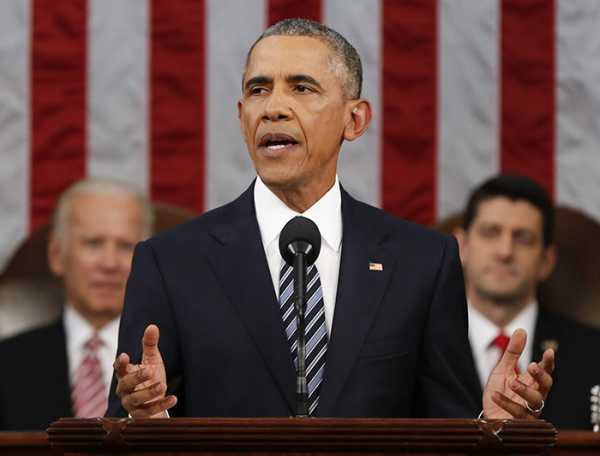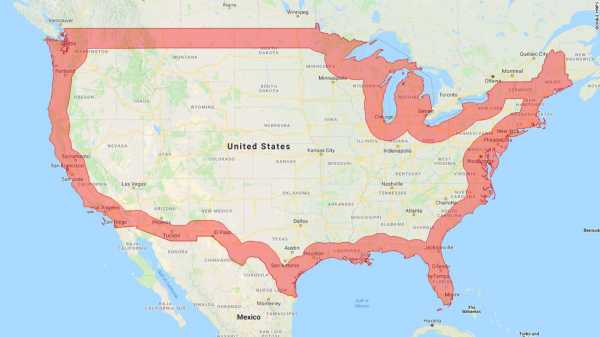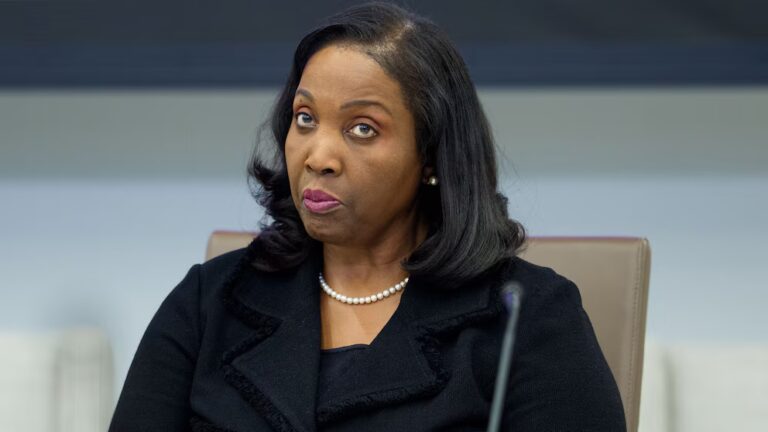
After watching six hours of Democratic debates across two separate nights this week, I was mildly surprised to wake up on Friday to the narrative that Democratic candidates were on the attack against Barack Obama.
I saw a Bloomberg headline asking “Why Are Democrats Attacking Obama?”, a Politico article headline reading “‘Stay away from Barack’: Dems seethe over criticism of Obama,” and a piece in the Hill titled “Hey, Democrats: Stop attacking our most beloved president in recent history.”
This was not at all the debate I saw, but it is useful spin for several different groups. That includes Donald Trump, who quipped to a Thursday night crowd in Cincinnati that “the Democrats spent more time attacking Barack Obama than they did attacking me, practically.” It’s also, of course, useful spin for former Vice President Joe Biden, who popped out of a diner stop in Detroit on Thursday to say, “I must tell you, I was a little surprised how much the incoming was about Barack.”
The timing of this sequence of events should tell you something. The fact that this narrative emerged after actual debate coverage suggested that it stems from Biden spinning it that way. Trump for his own reasons spun it that way, and left-wing intellectuals who really are sharply critical of Obama have also spun it that way.
What actually happened at the debate was some Democratic candidates issued not-particularly-original criticism of one specific element of Obama’s record — first-term immigration enforcement — that Obama himself sharply changed course on during his second term.
But while this discourse is not particularly accurate as a recounting of what happened Tuesday and Wednesday, it is a powerful window into both tactical maneuvering and real disagreements about ideas among Democrats.
The criticism: Obama’s enforcement-first approach was a mistake
What specifically happened was that a number of Democrats in the debate, including most pointedly New York City Mayor Bill de Blasio, criticized Barack Obama for having overseen record levels of deportations of undocumented immigrants.
Critically, though, even though several candidates were critical of Obama’s record — and of Joe Biden’s role in Obama’s administration — it’s not entirely clear what the policy disagreement is. After all, when moderator Don Lemon asked Biden, “[I]in the first two years of the Obama administration, nearly 800,000 immigrants were deported. Would the higher deportation numbers resume if you were president?” Biden answered, “Absolutely not.”
The former VP, in other words, is promising continuity with the policies that came at the end of the Obama administration rather than those of the beginning. The critics are mostly targeting policies from the beginning of Obama’s two terms, policies that not only has Biden disavowed but that Obama himself revised.
By late 2014, Obama was taking aggressive executive action to formally protect millions of undocumented immigrants from deportation and give them work permits only to be brushed back by the courts in series of cases that never reached an ultimate resolution because Trump became president. An interesting and productive thing for Democrats to argue about would be whether they would attempt to revive these possibly unconstitutional efforts. Instead, they have mostly wrangled over exactly who did what when, earlier in Obama’s presidency.
Obama’s deportation record
Obama entered office with a simple political strategy on immigration.
He wanted to take advantage of the fact that the Great Recession led to a massive decline in people wanting to come to the United States illegally to deploy extra resources to the border and proclaim that it had been secured.
Second, he wanted to signal to immigration activists and families with mixed immigration status that he was concentrating resources on criminals and new arrivals, rather than on long-settled workers who’d arrived in the 1990s or early aughts. Third, he wanted to do a deal with Republicans — comprehensive immigration reform — that would combine a path to citizenship for most long-settled unauthorized residents with business-friendly reforms to the legal immigration system and even more funding for border security.
Part of this initial approach, as Muzaffar Chishti, Sarah Pierce, and Jessica Bolter explained in a 2017 brief for the Migration Policy Institute, was “increasing penalties against unauthorized border crossers by putting far larger shares into formal removal proceedings rather than voluntarily returning them across the border, as had been longstanding practice.”
In other words, it used to be that if Border Patrol caught someone near the border, agents would typically offer them the chance to just leave the country rather than go into detention to fight the charge. If immigration enforcement officials nabbed someone who’d been living in the United States for years, that person would typically want to fight to stay and might have an extended legal battle.
But a recent border-crosser might prefer to go, and immigration enforcement officials would prefer the speedy resolution guaranteed by a voluntary return. Under Obama, with the immigration enforcement apparatus enjoying a surge of financial resources that began at the end of George W. Bush’s administration, this flipped. Now there would be no more voluntary returns, everyone was getting formally deported.
That helped Obama score headlines about record-setting deportation numbers that his team initially welcomed (though officials would later become crabby about anyone who pointed out that they welcomed the headlines). But it ended up becoming a problem for the administration because the second prong of the strategy proved hard to implement.
The theory of enforcement prioritization under Obama was that deportations would be focused on three unsympathetic categories — “recent border crossers,” “repeat immigration violators,” and “convicted criminals.” The image the public is supposed to have in their head is that if you’d been living in the United States for years, quietly working away with ties to the community, not breaking any laws, and hoping for Congress to create a path to citizenship program, you wouldn’t have anything to worry about. With approximately 11 million unauthorized immigrants living in the US, and federal law enforcement dealing with limited resources, the targets would be a couple of million troublemakers rather than everyone.
In practice, things look different in part because the legal definition of “the border” for immigration enforcement purposes is a 100-mile buffer around the country’s land and sea boundaries that encompasses all of Los Angeles, New York, Chicago, Philadelphia, both Portlands, and many other communities that do not fit a commonsense definition of the border. Consequently, when administration officials would offer statistics about deportations arising at “the border” versus “the interior,” there was no clear way to distinguish between a person found crossing the desert two days ago and a person who’d been living in Chicago for the past 20 years.

The set of “criminals,” similarly, included murderers and gang members but also people pulled over for speeding who were then found to be driving without a license. Nobody considers the occasional speeding ticket to be a huge moral failing, but it’s illegal to drive without a license. In most cases, it’s also illegal to get a driver’s license when you’re living in the country illegally, and in most of America, it’s impossible to conduct daily life without driving a car. Consequently, the criminal/non-criminal distinction ended up not exactly tracking an intuitive sense of who the bad guys are.
“Repeat immigration violators,” similarly, could be very sympathetic people — the kind of people Obama was promising not to deport — who just happened to have been deported before Obama took office and then snuck back in.
What’s more, all this prioritization was happening through memos and directives that were not self-enforcing and tended to cut against the practical instincts of front-line immigration enforcement personnel who (among other things) believe in the deterrent power of less-focused enforcement. Obama over the years made a few efforts to address criticism from immigration activists on these scores, issuing new rounds of memos and trying to focus enforcement more narrowly.
He also came very close in 2013 to achieving his ultimate goal of a comprehensive immigration reform bill. That this failed winds up being a big piece of the story, but it is worth emphasizing that Obama’s bill passed the Senate with a huge bipartisan majority and virtually every congressional reporter thought that a majority of House members supported it. His problem was that John Boehner, adhering to party cartel principles, wouldn’t bring it to the floor because even though most House members supported it, most House Republicans did not.
Had comprehensive immigration reform passed, we’d likely remember Obama’s early crackdown as a successful tactic. Instead, it stalled, Senate Republican disavowed the idea, activists moved on to an agenda of executive action scaling back enforcement, Democrats did terribly in the 2014 midterms, Obama rolled out his executive actions, courts blocked them, and then Donald Trump became president.
A lot of progressive intellectuals are mad at Obama
This whole saga about immigration enforcement is important, and it is true that many of Biden’s rivals for the presidency are critical of Obama’s approach. But Biden also vowed not to return to Obama’s initial ideas and implicitly Obama himself rejected this approach by changing course during his second term. The whole question of “incoming about Barack” is, in this context, fake news.
What’s not fake news is that lots of progressive intellectuals think Obama made very serious mistakes.
For a wild and over-the-top version of this, the writer and activist Matt Stoller did a Friday morning tweetstorm about how Obama was a “radical” rather than “incrementalist” who made American life worse in every way.
That’s a bit ridiculous.
What is true is that Obama has faced serious criticism from the left on a variety of fronts — the slow pace of economic recovery due to inadequate fiscal and monetary stimulus, willingness to cut Social Security and Medicare spending as part of a “grand bargain” on the long-term budget deficit, Treasury Secretary Tim Geithner’s aversion to “Old Testament justice” for bankers, and the large expansion of drone warfare abroad under his auspices.
What’s more, a lot of what’s happened in progressive politics over the past few years — including the increasing emphasis on explicit racial justice advocacy, renewed interest in anti-trust doctrine, and the reframing of climate policy as a “Green New Deal” — are kind of implicit rebukes to Obama’s approach to some issues.
Some of this is a slam on Obama’s ideas in a way that critiques of his immigration approach aren’t. Obama’s team doesn’t like it when people give them a hard time about deportations or castigate them personally over it, but they also adjusted their policies and are happy to admit there were flaws.
On bank regulation and the economic recovery, by contrast, they sincerely insist to this day that they made all the right choices and that listening to their critics would have produced disasters. Most of this is invisible to the mass public, which does not have deep convictions about fiscal or monetary policy and doesn’t care about proposed changes that didn’t happen (like the grand bargain). And many remember that by Obama’s final two years in office, the economy was in fine shape.
But geared-up intellectuals and activists do care about all these things and want a president who will listen to them next time. The fact that Biden does not seem to share any of these criticisms of Obama and has a pre-White House record that was a bit more conservative than Obama’s worries them. But Obama is very popular; people openly campaigning that anti-Biden equals anti-Obama would be a political disaster. So Biden really likes that framing.
Everyone is dancing delicately around Obama’s legacy
Stoller posits a simple schematic dichotomy between Sen. Elizabeth Warren’s strategy of appeasing Obama fans and Sen. Bernie Sanders directly challenging Obama’s popularity in the party.
The reality is far more complicated. Many Democratic Party professionals hate Sanders because he refuses to formally join the political party to which they’ve dedicated their life, and because he was repeatedly a troublemaker during the 2016 primary campaign: He stayed in the race long after his odds of victory had become hopeless, and spoiled the first couple of days of the Democratic Convention by getting geared up about emails stolen by the Russian government from the DNC server. Warren, by contrast, has a little D next to her name, stayed neutral in the primary, and is seen by partisan Democrats as a properly partisan person.
But as a senator in the Obama years, Sanders was a very conventional blue state liberal. He voted for the Affordable Care Act and the Dodd-Frank bill and every other piece of major controversial Obama-era legislation. He tended to express his dissent by casting protest votes against bipartisan bills that sailed through the Senate with huge majorities. He was more left-wing than Obama, but not a troublemaker. He didn’t hold must-pass bills hostage or otherwise cause problems for the White House.
Warren, by contrast, spiked a significant Obama nominee, led a revolt against a government funding bill, and otherwise greatly annoyed actual serving members of the Obama administration.
All of the main candidates are, however, in one way or another testing or prodding Obama’s political legacy. Booker at one point dabbled in Obama’s political strategy of using his credibility as a black man to explicitly downplay the significance of race in American life, but he’s since walked away from that.
Sen. Kamala Harris, former Rep. Beto O’Rourke, and South Bend, Indiana, Mayor Pete Buttigieg don’t go as far as Sanders or Warren in their proposed overhauls of the health care system, but all three want to walk away from the compact at the heart of the Affordable Care Act. Biden, meanwhile, wields Obama as both a sword and a shield but doesn’t resemble him at all biographically or stylistically. And when not locked in close combat with his rivals, Biden appears to believe that their different personal styles would let Biden work more effectively with Republicans and return to the kind of brokerage-style politics that prevailed in the pre-Obama era.
None of these candidates particularly wants to criticize Obama (though Biden does want to bait them into criticizing him), but you don’t run for president without a big ego and a pet theory about how you could do a better job than the last guy.
Sourse: vox.com






